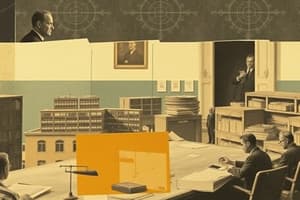Podcast
Questions and Answers
Why is it important to study management theory?
Why is it important to study management theory?
- To memorize historical approaches to management
- To standardize management practices
- To disregard instincts and hunches in decision-making
- To understand the interrelationships between theory, behavior, and management practice (correct)
Who developed the concept of 'administration' based on his own management experience?
Who developed the concept of 'administration' based on his own management experience?
- Max Weber
- Frederick Taylor
- Henry Fayol (correct)
- Chris Blunkell
What did Henry Fayol develop based on his management experience?
What did Henry Fayol develop based on his management experience?
- Principles of bureaucracy
- Five functions of management (correct)
- Theory of organizational behavior
- Concept of rational organizational design
What does the classical approach to management emphasize?
What does the classical approach to management emphasize?
As per the text, what did Max Weber's concept of bureaucracy emphasize?
As per the text, what did Max Weber's concept of bureaucracy emphasize?
What did Max Weber's concept of bureaucracy aim to replace as organizations grow in size?
What did Max Weber's concept of bureaucracy aim to replace as organizations grow in size?
What did Henry Fayol consider as an important aspect of management in small organizations?
What did Henry Fayol consider as an important aspect of management in small organizations?
What is a key reason for the continuing importance of earlier management ideas?
What is a key reason for the continuing importance of earlier management ideas?
What does management theory help understand?
What does management theory help understand?
What did Max Weber's concept of bureaucracy evolve from?
What did Max Weber's concept of bureaucracy evolve from?
What did Henry Fayol consider as organizations grow in size?
What did Henry Fayol consider as organizations grow in size?
What did Max Weber's concept of bureaucracy aim to achieve through rational organizational design?
What did Max Weber's concept of bureaucracy aim to achieve through rational organizational design?
Which approach focuses on efficiency and de-skilling, leading to worker hostility and suspicion?
Which approach focuses on efficiency and de-skilling, leading to worker hostility and suspicion?
What does bureaucratic control involve to facilitate management and address the problem of diminishing control as an organization grows?
What does bureaucratic control involve to facilitate management and address the problem of diminishing control as an organization grows?
Which contemporary rationalization technique extends rationalized techniques for efficiency and control?
Which contemporary rationalization technique extends rationalized techniques for efficiency and control?
What did the Hawthorne Studies highlight the significance of in shaping work norms, perceptions, and identity?
What did the Hawthorne Studies highlight the significance of in shaping work norms, perceptions, and identity?
Which management approach views an organization as interdependent parts interacting with the environment through inputs, throughputs, and outputs?
Which management approach views an organization as interdependent parts interacting with the environment through inputs, throughputs, and outputs?
What does the contingency approach emphasize for successful design?
What does the contingency approach emphasize for successful design?
Which management thinking concept includes the idea of the learning organization?
Which management thinking concept includes the idea of the learning organization?
What did the Neo-human relations approach focus on from the 1950s to 1960s?
What did the Neo-human relations approach focus on from the 1950s to 1960s?
What does the postmodernism approach challenge traditional views of organization as?
What does the postmodernism approach challenge traditional views of organization as?
What does the classical approach to management emphasize?
What does the classical approach to management emphasize?
What does the systems approach reject the idea of?
What does the systems approach reject the idea of?
What does the concept of McDonaldisation extend rationalized techniques for?
What does the concept of McDonaldisation extend rationalized techniques for?
Flashcards are hidden until you start studying
Study Notes
Rational Organizational Design and Contemporary Approaches
- Rational organizational design emphasizes the importance of bureaucracy for efficiency and control.
- Bureaucratic control involves hierarchy, rules, procedures, and paperwork to facilitate management and address the problem of diminishing control as an organization grows.
- Despite its benefits, bureaucracy is criticized for dehumanization, disenchantment, red tape, and jobsworth behaviors.
- Rational work design, exemplified by Frederick Taylor's scientific management and Henry Ford's assembly line, focuses on efficiency and de-skilling, leading to worker hostility and suspicion.
- Contemporary rationalization includes McDonaldisation, extending rationalized techniques for efficiency and control, as well as other models like 'no frills' services and value engineering.
- The Hawthorne Studies highlight the significance of social interactions and informal organization in shaping work norms, perceptions, and identity.
- Neo-human relations, from the 1950s to 1960s, focused on human personality, motivation, and management theories such as Theory X and Theory Y.
- The systems approach views an organization as interdependent parts interacting with the environment through inputs, throughputs, and outputs.
- The contingency approach rejects the idea of a single best organizational form, emphasizing the importance of situational variables for successful design.
- Postmodernism challenges traditional views of organization as a planned and calculative action, emphasizing the defensive reaction to societal forces.
- Innovative management thinking includes the concept of the learning organization, where continuous experimentation and improvement are encouraged.
- Understanding the changes in management theory and practice over the past 100 years can benefit managers by providing insights into different approaches, enabling better organizational analysis, and helping in the selection of ideas that best suit the job requirements.
Studying That Suits You
Use AI to generate personalized quizzes and flashcards to suit your learning preferences.




